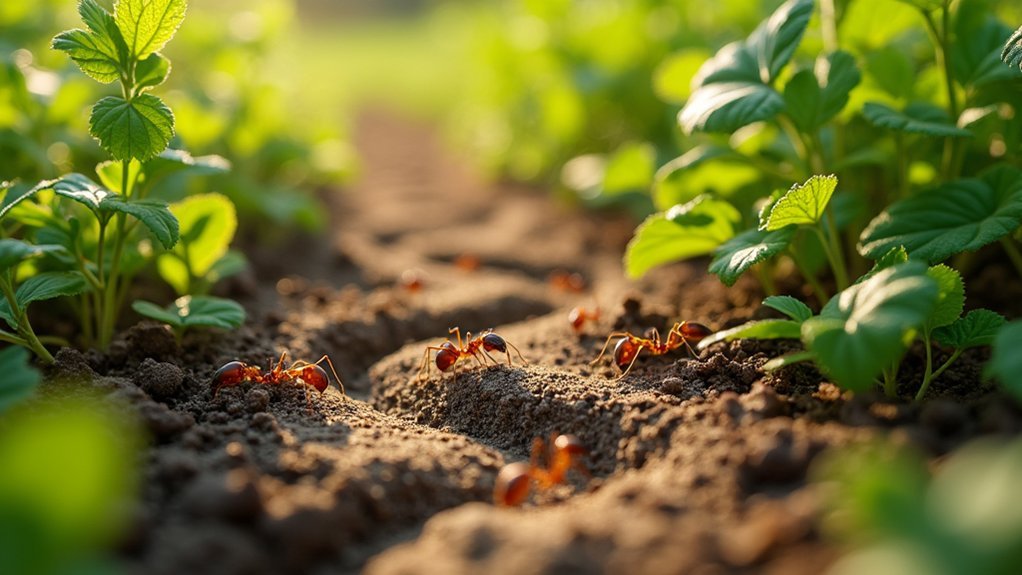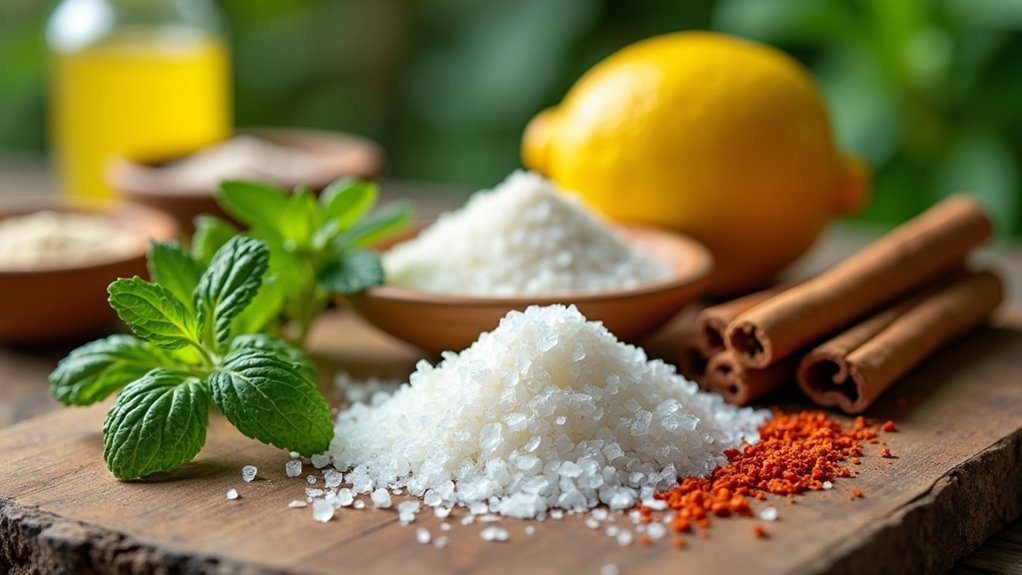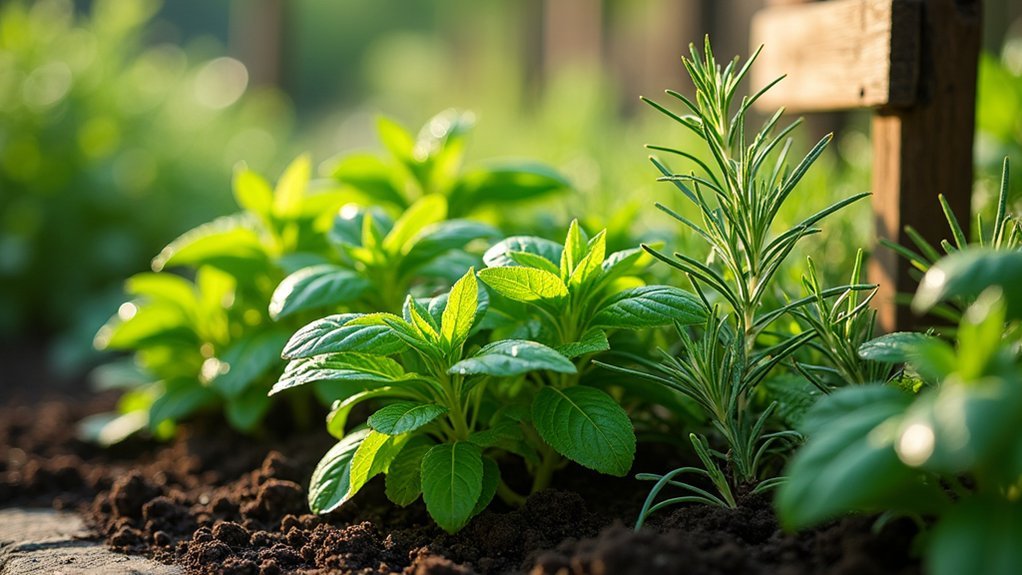Effective natural ant control combines understanding garden ant species with strategic prevention. Create physical barriers using diatomaceous earth or gravel, and apply essential oil sprays like peppermint or cinnamon to disrupt trails. Keep your yard clean of food sources, and encourage natural predators through diverse plantings. Follow a seasonal maintenance calendar, addressing potential issues before they escalate. Early intervention with non-toxic solutions guarantees your garden remains ant-free while maintaining its ecological balance.
Understanding Ant Species in Your Garden Ecosystem

While many gardeners view ants as mere nuisances, understanding the specific species inhabiting your garden is essential for effective natural control.
Garden ants often benefit your ecosystem through soil aeration, while carpenter ants can damage wooden structures, and fire ants pose painful stinging hazards.
Watch for ant trails to identify species and their nesting sites. You’ll notice some ants form mutualistic relationships with aphids, protecting these plant-damaging pests in exchange for sweet honeydew secretions. This partnership can greatly impact your garden’s health.
Not all ants are enemies—many contribute to natural pest control by consuming other insects and organic debris.
The Hidden Benefits of Some Ant Species Outdoors
Many gardeners rush to eliminate ants without considering the significant ecological benefits these tiny creatures provide. Before reaching for natural ant repellent, understand that beneficial ant species actually help your garden thrive.
| Benefit | Ant Activity | Garden Impact |
|---|---|---|
| Soil Health | Soil aeration | Enhances nutrient absorption |
| Pest Control | Prey on harmful insects | Maintains balanced ecosystem |
| Decomposition | Break down organic material | Enriches soil composition |
| Propagation | Seed dispersal | Establishes new plant growth |
| Biodiversity | Support microorganisms | Promote healthy growth |
You’ll find garden ants contribute to decomposition by processing dead insects and plant material. Their tunneling improves soil structure, allowing better water infiltration to plant roots. These industrious creatures often indicate a thriving ecological balance, working alongside other beneficial insects to naturally maintain your garden’s health.
Creating Physical Barriers to Protect Garden Areas

Once you’ve identified which ant species to manage, establishing physical barriers offers effective, non-toxic protection for vulnerable garden areas.
Try creating a barrier using fabric strips or gravel around your garden’s perimeter to physically block ant entry.
Diatomaceous earth serves as both a boundary and natural insecticide, harming ants that attempt to cross it.
Consider installing raised garden beds to elevate plants beyond easy ant access. For additional protection, apply mulch or wood chips around plants—they create an inhospitable environment for ants while improving soil health.
Don’t forget the importance of regularly inspecting and sealing cracks in garden structures.
These maintenance steps greatly reduce the risk of ant infestations. By combining these physical deterrents, you’ll protect your garden without resorting to harsh chemicals.
Essential Oil Sprays That Naturally Repel Ants
Nature’s aromatherapy offers powerful solutions for ant problems without harmful chemicals.
You’ll find peppermint essential oil particularly effective—mix 10-20 drops with 2 cups of water and spray around entry points to create a barrier against European red ants.
Tea tree oil works double-duty as both a natural repellent and insecticide. Dilute it with water and apply to common ant pathways to disrupt their pheromone trails.
Tea tree oil: nature’s two-pronged ant solution that disrupts communication networks while eliminating unwanted visitors.
For another effective ant control option, try lemon eucalyptus oil, which contains citronella. Simply saturate cotton balls and place them strategically around infested areas.
Don’t overlook cinnamon leaf oil as a powerful pest deterrent. Its strong scent repels ants while its active compounds can actually kill them.
These essential oils provide targeted protection that’s safe for your garden ecosystem.
Kitchen Ingredient Solutions for Effective Ant Control

While pesticides offer quick results, your kitchen cabinets already contain powerful ant-fighting ingredients that work just as effectively.
Mix vinegar with water to disrupt pheromone trails and keep ants away from your home. For a lethal solution, combine borax with sugar—ants carry this mixture back to their colony, eliminating your ant problem at its source.
Lemon juice works wonders when sprayed around entry points, masking food scents that attract these pests.
Sprinkle used brew coffee grounds in ant-prone areas for an organic repellent that enriches soil outdoors. Create a barrier with cayenne pepper diluted in water—ants won’t cross this spicy threshold.
These natural methods complement peppermint and other essential oil strategies, giving you multiple ways to control ants without harsh chemicals.
Strategic Planting: Ant-Repelling Herbs and Flowers
Your garden can become your first line of defense against ant invasions through strategic planting.
Herbs like mint, rosemary, and basil naturally repel ants with their potent scents that disrupt ant communication and navigation.
Incorporate lavender around your garden’s perimeter to create a beautiful yet effective barrier against ant intruders.
Marigolds serve dual purposes – adding vibrant color while emitting compounds that interfere with ants’ pheromone trails, confusing and deterring them.
For maximum protection, place these ant-repelling herbs and flowers strategically near garden beds and home entry points.
This natural barrier approach not only prevents ant infestations but also enhances your garden’s diversity and appeal.
Combine different plants for extensive coverage, creating a garden that’s both beautiful and naturally ant-resistant.
Diatomaceous Earth and Other Mineral-Based Deterrents
Among the most effective natural ant control solutions, diatomaceous earth stands out as a powerful yet non-toxic option for gardeners and homeowners. This fine powder works by dehydrating ants upon contact, disrupting their populations without harmful chemicals.
For maximum effectiveness, always apply in dry conditions, as moisture reduces DE’s ability to adhere to ant exoskeletons.
What makes diatomaceous earth truly valuable for organic outdoor prevention is that it’s safe to use around pets and children, offering an eco-friendly alternative to chemical pesticides. Just avoid inhaling the fine particles during application.
For extensive protection, combine DE with other mineral-based deterrents like boron compounds mixed with sugar to target the colony’s reproductive system.
Remember to reapply after rain or wind to maintain your protective barrier.
Managing Food Sources That Attract Ants to Your Yard
Because ants actively seek out food sources in your yard, eliminating these attractants forms the foundation of effective natural control. Different ant species gravitate toward sugary substances, greasy residues, and pet food left outdoors.
Store all food in airtight containers and clean spills immediately to prevent infestations.
Maintain a clean yard by regularly mowing grass and trimming vegetation to reduce ant hiding spots. Always inspect outdoor dining areas for crumbs and food scraps that might attract colonies.
Remove fallen or overripe fruits from trees and ground promptly.
Secure trash bins with tight-fitting lids and dispose of waste frequently as part of your organic outdoor prevention strategy.
Encouraging Natural Ant Predators in Your Garden
When seeking sustainable ant management solutions, fostering natural predators in your garden creates an effective biological control system.
Introduce beneficial insects like ladybugs and lacewings that target aphids—those honeydew-producing insects that ants actively farm and protect.
Deploy ladybugs and lacewings as strategic partners against the aphid farms that sustain persistent ant colonies.
Create bird-friendly habitats to attract swallows and sparrows, natural ant deterrents that help maintain population balance.
Ground beetles serve as powerful allies in organic outdoor prevention by consuming ant larvae and disrupting colonies.
Don’t overlook spiders—while not direct ant predators, they reduce populations of insects that ants depend upon.
The key to successful natural ant control lies in cultivating a balanced ecosystem through diverse plantings.
This approach not only addresses your ant concerns but promotes a thriving garden environment without chemical interventions.
Seasonal Ant Prevention Maintenance Calendar
While establishing a balanced ecosystem helps control ant populations naturally, following a structured seasonal maintenance schedule will maximize your long-term success.
Implementing seasonal ant prevention tasks throughout the year guarantees continuous protection against unwanted colonies.
- Spring: Clean up debris and remove aphids from plants to reduce ant attraction. This early intervention sets the foundation for year-round control.
- Summer: Regularly inspect for ant trails and nests when activity peaks. Prompt action prevents infestations from establishing.
- Fall: Maintain a tidy yard by clearing fallen leaves that could become ant hideouts before winter.
- Winter: Seal openings around your home’s exterior to block spring re-entry points.
Don’t forget monthly maintenance with natural deterrents like vinegar and essential oils around entry points to create persistent protective barriers.
Frequently Asked Questions
What Is the Best Homemade Ant Killer for Outdoors?
Mix borax with sugar for the best homemade outdoor ant killer. The sugar attracts ants while borax disrupts their digestion, killing them when they return to their colony. It’s highly effective and inexpensive.
How to Get Rid of Ants Outdoors Permanently?
To get rid of ants outdoors permanently, you’ll need a multi-pronged approach. Keep your yard clean, apply diatomaceous earth, use vinegar sprays, eliminate aphids, and set borax bait traps to target entire colonies.
Can I Sprinkle Cinnamon on My Plants for Ants?
Yes, you can sprinkle cinnamon around your plants to deter ants. It’s a safe, natural repellent that disrupts their trails. Just remember to reapply after rain or watering for continued effectiveness.
What Keeps Ants Away Naturally?
You can keep ants away naturally with peppermint or cinnamon leaf oils, vinegar sprays, coffee grounds, and cornmeal-borax baits. Don’t forget to maintain cleanliness by removing food sources and sealing entry points.
In Summary
You’ve learned that complete ant elimination isn’t necessary or beneficial for your garden ecosystem. By identifying problematic species, creating natural barriers, using plant-based repellents, and maintaining seasonal preventive measures, you’ll establish a balanced outdoor environment. Remember, it’s about management, not eradication. With these organic solutions in your gardening toolkit, you’re well-equipped to coexist with beneficial insects while protecting your valuable plants and outdoor living spaces.





Leave a Reply